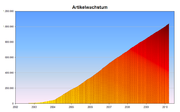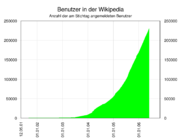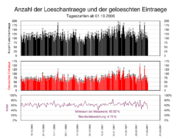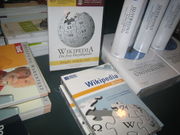German Wikipedia
 |
|
|
Screenshot
|
|
| URL | http://de.wikipedia.org/ |
|---|---|
| Commercial? | No |
| Type of site | Internet encyclopedia project |
| Registration | Optional |
| Available language(s) | German |
| Owner | Wikimedia Foundation |
| Created by | German wiki community |
| Launched | 16 March 2001 |
The German Wikipedia (German: Deutschsprachige Wikipedia) is the German-language edition of Wikipedia, a free and mostly publicly editable online encyclopedia. It is the second oldest and, with over 1,160,000 articles, the second largest Wikipedia, behind the English Wikipedia.[1][2]
Contents |
History
The first non-English Wikipedia subdomain was the German one, originally named deutsche.wikipedia.com. Its creation was announced by Jimmy Wales on 16 March 2001.[2] One of the earliest snapshots of the home page, dated 2001-03-21 (revision #9), can be seen at the Wayback Machine site.[3] Aside from the home page, creation of articles in the German Wikipedia started as early as April 2001, apparently with translations of Nupedia articles.[4] The earliest article still available on Wikipedia's site is apparently Polymerase-Kettenreaktion, dated May 2001.[5]
Size, coverage and popularity

As of 27 December 2009[update] this edition had more than 1,000,000 articles,[6] second only to the English language edition. The millionth article was about Ernie Wasson. In November 2008, 90% of the articles had more than 512 bytes, 49% had more than 2 KB, and the average article size was 3476 bytes.[7] In the middle of 2009 this edition had nearly 250,000 biographies and in December 2006 more than 48,500 disambiguations.[8]
Compared to the English Wikipedia, the German one tends to be more selective in its coverage, often rejecting small stubs, articles about fictional characters and similar materials. There are some exceptions to the "cultural" rule; although the characters from Star Wars have been condensed into one article, some characters such as Wolverine have their own pages.
The January 2005, Google Zeitgeist announced that "Wikipedia" was the #8 most searched query on Google.de. In February 2005 Wikipedia reached third place behind Firefox and Valentine's Day. In June 2005, Wikipedia ranked first.
Language and dialects

Separate Wikipedias have been created for several German dialects, including Alemannic German (als:), Low German (nds:), Luxembourgish (lb:), Pennsylvania German (pdc:), Ripuarian (formerly Kölsch; ksh:), and Bavarian (bar:).
Characteristics

The German Wikipedia is different from the English Wikipedia in a number of aspects.
- Compared to the English Wikipedia, there are stricter rules of encyclopedic notability for deciding if an article about a topic should be allowed. The criteria for notability are more specific, each field has its own specific guidelines.[9]
- There are no fair use provisions. Images and other media that are accepted on the English Wikipedia as fair use may not be suitable for the German Wikipedia.[10] However, the threshold of originality is set much higher, which often allows the use of company logos and similar icons, too.
- The use of scholarly sources, in preference over journalistic and other types of sources, is more strongly encouraged. The German Verifiability (Belege) guideline classifies scholarly sources as inherently more reliable than non-academic sources; the latter's use is – in theory at least – only permitted if there is a lack of published academic sources covering a topic.[11]
- In September 2005, Erik Möller voiced concern that "long term page protection is used excessively on the German Wikipedia"[12]: On 14 September 2005, 253 pages were fully protected (only editable by admins) for more than two weeks (compared to 138 in the English Wikipedia). This was the highest number of such blocks of all Wikipedias.[13] As of May 2008[update], the German Wikipedia still had the highest percentage of semi-protected articles - 0.281% - among the ten largest Wikipedias (articles not editable by unsubscribed or recently subscribed users), but with respect to the fraction of fully protected articles (0.0261%) it actually ranks fourth, behind the Japanese, Portuguese and English Wikipedias.[14]
- Vandalism and other abuse is often handled in a less formal way. Vandals may get blocked on their first edit and without warning if their edit clearly shows lack of interest for actual encyclopaedic work. This is especially true if the added text includes unlawful statements, such as holocaust denial.
Similarly, the Checkuser function is rarely used to determine multiple accounts, as “suspicious” accounts are often blocked on sight. - Articles on indisputably notable subjects may be deleted if they are deemed too short. While the requirements for minimal articles (called stubs) are equivalent, the German and the English Wikipedia differ greatly in the way they are put into practice.[15]
- On 28 December 2005 it was decided to eliminate the Category "stub" (and the corresponding template identifying articles as stubs) from the German Wikipedia.[16]
- Users do not have to create an account in order to start a new article.
- Unlike the French, Polish, Italian or many other Wikipedias, the German one does not contain large collections of bot-generated geographical stubs or similar articles.
- Unlike the French and English Wikipedias, the German version did not have an Arbitration Committee until May 2007.
- Categories are singular and are not differentiated for gender. Categories are usually introduced only for a minimum of ten entries and are not always subdivided even for larger numbers of items, so that current categories often describe only one property (e.g., nationality). Other categories are subdivided, but differently than in the English Wikipedia. For example, "chemists" are subdivided by century, not by nationality. A university professor, on the other hand, will usually be categorized according to where he or she teaches.
- The equivalent to the English Wikipedia's featured articles and good articles are exzellente Artikel (excellent articles) and lesenswerte Artikel (good articles; literally: articles "worth reading").
- In 2005, there was a discussion and poll resulting in the decision to phase out the use of local image uploads and to exclusively use Wikimedia Commons for images and other media in the future.[17] The attempt to implement this lasted for about a year and the German "Upload file" page displayed a large pointer to Commons in this time, but since December 2006, there is again a local image upload page without any pointer to Wikimedia Commons. This was prompted by the deletion of images on Commons that are acceptable according to German Wikipedia policies.[18]
- Starting in December 2004, German Wikipedians pioneered Persondata ("Personendaten"), a special format for meta data about persons (name, birth date and place etc.), introduced in the English Wikipedia in December 2005. In the beginning, the main aim of this system was to aid the search features of the DVD edition of the German Wikipedia (see below). During its introduction in January 2005, Personendaten were added to some 30,000 biographical articles on the live Wikipedia, partly aided by a somewhat automatic tool.[19]
- Like the Signpost in the English Wikipedia, the German Wikipedia also has its own internal newspaper, the Kurier. However, the Kurier is laid out on a single page and is not issued weekly but is continuously updated by interested Wikipedians, with older articles being archived.
Reviewed versions
At Wikimania 2006, Jimbo Wales announced that the German Wikipedia would soon institute a system of "stable article versions" on a trial basis. The system went live in May 2008. Certain users are now able to mark article versions as "reviewed", indicating that the text contains no obvious vandalism. A note in the top right corner of the screen indicates to the reader whether or not the present version of an article has already been reviewed, and provides access to the most recent reviewed version or a more current, unreviewed version as needed.
Miscellanea
Events
The first real-life meetup of Wikipedians took place in October 2003 in Munich.
Each spring and autumn the German Wikipedia organizes a writing contest where a community elected jury rates nominated articles. Prizes are sponsored by individual community members and companies. The first contest was held in October 2004, among the 44 nominations the article Kloster Lehnin (Lehnin Abbey) won. The second contest in March saw 52 contributions, the third in September 2005 already 70. A trial to extend the contest to an international level met with limited success, only the Dutch, English and Japanese Wikipedias participated in the end[20] For the writing contest in March 2006 the 150 nominations were split in three sections, history & society (56 nominations), arts & humanities (36) and science (46). The article on the Braunbär (Brown Bear) won, 27 articles reached featured status a few weeks after the contest.[21] In March 2007 there was the 6th edition with the winning article Haager Konvention zum Schutz von Kulturgut bei bewaffneten Konflikten (Hague Convention for the Protection of Cultural Property in the Event of Armed Conflict).
German Wikipedians organized the first international Wikipedia conference, Wikimania 2005, in August 2005 in Frankfurt. Some 300 people from over 50 countries attended the three-day conference.
From 17 March to 15 April 2006, the Göttingen State and University Library held a special exhibition documenting the first 5 years of Wikipedia.[22]
In 2006 at the University of Göttingen the first Wikipedia Academy was held. The Academy is intended to familiarize the academic world with Wikimedia projects. In 2007 the second meeting took place. This year the event was organized in conjunction with the Akademie der Wissenschaften und der Literatur (Academy of Science and Literature) in Mainz and was a part of the German Jahr der Geisteswissenschaften (Year of the Humanities), organized by the German Federal Ministry for Education and Research. The event had a remarkable impact on German scholars' view of Wikipedia and its sister projects in general. A third meeting was organized on 20–21 June 2008 in Berlin. Partner in the "Jahr der Mathematik" (Year of Mathematiks) was the Berlin-Brandenburg Academy of Sciences and Humanities.[23]
The German Wikipedians have organized since 2007 some meeting of the photographers with participants from 10 countries.
Contacts with Brockhaus
In April 2004, a complete list of article titles from the leading German encyclopedia Brockhaus was uploaded to the German Wikipedia, in an apparent attempt to facilitate the creation of still missing articles. A representative of Brockhaus asked for and obtained the deletion of what was believed to be a copyright infringement. As a result of the developing email conversation, a group of five Wikipedians visited the "new media" group of Brockhaus in Mannheim on 1 July 2004.[24] The friendly meeting saw a lively discussion of the differing approaches to writing an encyclopedia; it became clear that Brockhaus had closely observed Wikipedia for quite some time.
Article-free Sunday
On 23 November 2006, the number of articles at German Wikipedia reached 500,000. As a response to this and to the perception that quality control was not keeping up with article creation, it was proposed to declare 10 December 2006 "Article-free Sunday", a day where participants voluntarily agree to post no new articles, but instead focus on improving existing ones. It was also proposed to declare 10 December "Counter-action to Article-free Sunday", a day where participants create missing articles and improve existing ones.
Subsidies from the German government
In June 2007, a project on renewable resources (WikiProjekt Nachwachsende Rohstoffe) was initiated,[25][26] the goal being to write and improve articles on the topic. The project will run for three years and is subsidized by the German Ministry of Agriculture with approximately €80,000 a year. It is organised and managed by the private company "nova-Institut GmbH". Nova GmbH and Wikimedia Deutschland e. V. fund the project with approximately €60,000 a year in addition, so the budget is approximately €420,000 in total.
These funds are mainly used to organise the project and also to search for experts in the field who have not contributed to Wikipedia yet. Nova may also pay expense allowances to authors.[27]
Reviews and research
In September 2004, the respected computer magazine c't compared the German Wikipedia with the Brockhaus Multimedia encyclopedia and the German edition of Microsoft's Encarta. On a scale from 0 to 5, Wikipedia 'won' with a total score of 3.4.[28]
A few weeks later, the weekly newspaper Die Zeit also compared content from Wikipedia with other reference works and found that Wikipedia only has to "share its lead position in the field of natural science."
The DVD version of Spring 2005 received a rather negative review by Björn Hoffmann — product manager working for the Bibliographisches Institut & F.A. Brockhaus in July 2005.
In November 2005 the OpenUsability project in cooperation with the Berlin based "Relevantive AG" conducted a usability test of the German Wikipedia.[29] The study focused on finding information and included a set of recommendations to change the MediaWiki interface. In February 2006 the open usability project led a second test which focused on the experience of new editors.[30] The reports were published in English.
A second test by c't in February 2007 used 150 search terms, of which 56 were closely evaluated, to compare four digital encyclopedias: Bertelsmann Enzyklopädie 2007, Brockhaus Multimedial premium 2007, Encarta 2007 Enzyklopädie and Wikipedia. With respect to concerns about the reliability of Wikipedia, it concluded: "We did not find more errors in the texts of the free encyclopedia than in those of its commercial competitors".[31]
In December 2007, German magazine Stern published the results of a comparison between the German Wikipedia and the online version of the 15-volume edition of Brockhaus Enzyklopädie. The test was commissioned to a research institute (Cologne-based WIND GmbH), whose analysts assessed 50 articles from each encyclopedia (covering politics, business, sports, science, culture, entertainment, geography, medicine, history and religion) on four criteria (accuracy, completeness, timeliness and clarity), and judged Wikipedia articles to be more accurate on the average (1.6 on a scale from 1 to 6, versus 2.3 for Brockhaus with lower = better). Wikipedia's coverage was also found to be more complete and up to date, however Brockhaus was judged to be more clearly written, while several Wikipedia articles were criticized as being too complicated for non-experts, and many as too lengthy.[32][33][34]
Off-line publication
CD November 2004
In November 2004, Directmedia Publishing GmbH started distributing a CD-ROM containing a German Wikipedia snapshot. Some 40,000 CDs were sent to registered customers of directmedia. The price was 3 euros per CD.
The display and search software used for the project, Digibib, had been developed by Directmedia Publishing for earlier publications; it ran on Windows and Mac OS X (and now also on Linux). The Wikipedia articles had to be converted to the XML format used by Digibib.
To produce the CD, a dump of the live Wikipedia had been copied to a separate server, where a team of 70 Wikipedians vetted the material, deleting nonsense articles and obvious copyright violations. Questionable articles were added to a special list, to be reviewed later. The final CD contained 132,000 articles and 1,200 images.
The ISO image was distributed for free via eMule and BitTorrent. In December, the CHIP computer magazine placed the Wikipedia data on the DVD that it distributes with every issue. The Wikipedia materials are published under GFDL while the Digibib software may only be copied for non-commercial use, except the Linux version which is GPLed.
CD/DVD April 2005
A new release of Wikipedia content was published by Directmedia on 6 April 2005. This package consisted of a 2.7 GB DVD and a separate bootable CDROM (running a version of Linux with Firefox). The CDROM did not contain all the data, but was included to accommodate users without DVD-drives. The DVD used Directmedia's Digibib software and article format; everything could be installed to a hard drive. In addition, the DVD contained an HTML tree, as well as Wikipedia articles formatted for use with PDAs (specifically, the Mobipocket and TomeRaider formats).
The production of the DVD motivated the Personendaten project (see above).
The vetting process was similar to the one for the CD described above and took place on a separate MediaWiki server. The process took about a week and involved 33 Wikipedians, communicating on IRC. To prevent duplication of work, editors would protect every article that they had reviewed; links to protected articles were shown in green. Lists of potential spammed or vandalized articles had been produced ahead of time with SQL queries. Unacceptable articles were simply deleted on the spot. While the XML articles for the earlier CD version had been produced from HTML, this time a script was used to convert Wiki markup directly to the Digibib format. The final DVD contained about 205,000 articles, with every article linking to a list of contributors.
Directmedia sold 30,000 DVDs, at €9.90 each. This price included 16% taxes and a one-euro donation to Wikimedia Deutschland; production costs were about €2. The DVD image can also be downloaded for free.
Following the successful launch of the DVD, Directmedia donated high-resolution pictures of 10,000 public domain paintings to Wikimedia Commons (see related Signpost story).
DVD/book December 2005

The next edition of Wikipedia content was issued in December 2005 by the publisher Zenodot Verlagsgesellschaft mbH, a sister company of Directmedia. A 139 page book explaining Wikipedia, its history and policies was accompanied by a 7.5 GB DVD containing 300,000 articles and 100,000 images. The book with DVD is sold for €9.90; both are also available for free download.[35]
The vetting process for this version was different and did not involve human intervention. A "white list" of trusted Wikipedians was assembled, the last 10 days of every article's history were examined, and the last version edited by a white-listed Wikipedian was chosen for the DVD. If no such version existed, the last version older than 10 days was used. Articles nominated for cleanup or deletion were not used.
DVD December 2006/2007 and 2007/2008
The December 2006/2007 and 2007/2008 edition can be downloaded from dvd.wikimedia.org.
Books
Wikipress series
The December 2005 book about Wikipedia was the first in a series titled Wikipress. These books, published by Zenodot, consisted of a collection of Wikipedia articles about a common topic, selected and edited by so-called "Wikipeditors" who may receive compensation from Directmedia. The books were assembled on a separate server from those used for the regular German Wikipedia pages. Every Wikipress book was accompanied by an "edit card", a post card that readers could send in to edit the book's contents. Wikipress books about the Nobel Peace Prize, bicycles, Antarctica, the solar system, and Hip hop, amongst others, were released, and other books on topics as diverse as Whales, Conspiracy theories, Manga, Astrophysics, and the Red Cross were in the works.[36] Due to lack of interest, the project was ended after a few books.
100 volume Wikipedia
The publisher Zenodot announced in January 2006 that they intend to publish the complete German Wikipedia in print, 100 volumes with 800 pages each, starting with the letter A in October 2006, followed by two volumes each month thereafter, to end with Z in 2010. The project, code named WP 1.0, was to be supported by 25 editors employed by Zenodot as well as a scientific advisory board. Changes made to articles before publication would also be available for incorporation into the online Wikipedia.
In March 2006, Zenodot organized a "community day" to meet with Wikipedians and discuss the project. Groups of Wikipedians had already begun to polish articles with titles Aa-Af in selected topics. In late March it was announced that the project was put on hold and no books would be published in 2006; the reason given was that community support was lacking.[37]
Bertelsmann
On 23 April 2008, the publisher Bertelsmann announced that it planned to publish a one-volume encyclopedia in September using content from the German-language Wikipedia. The volume was planned to include abbreviated entries for the 50,000 most commonly used search terms of the prior two years. The book is priced at 19.95 euros, with one euro from every sale going to the German chapter of the Wikimedia Foundation.[38] It was released on 15 September 2008 in hardcover, containing 992 pages and many illustrations.[39]
Legal issues and controversies
Unauthorized uses
While everyone is free to use Wikipedia content, there are certain conditions, such as attribution, a copy of the license text and no non-free derivative works (see GNU Free Documentation License for details).
In March 2005, the German news magazine Der Spiegel published an article on the Rwandan Genocide in its online edition; it was a copy of Wikipedia's article. The article was taken down soon after and replaced with an apology.[40]
In April 2005, the encyclopedia Brockhaus published an article about the new pope Josef Ratzinger in its online edition. Because of its close similarity to Wikipedia's article, suspicion arose right away that the Brockhaus article might have been plagiarism. The article was removed soon after but Brockhaus did not apologize or admit guilt (see the Wikipedia Signpost's coverage.)
Large-scale copyright infringement (2003–2005)
In mid-November 2005, it was discovered that an anonymous user had entered hundreds of articles from older encyclopedias that had been published in the 1970s and 1980s in East Germany. The articles were mainly on topics in philosophy and related areas. The user had started in December 2003.
A press release was issued and numerous editors started to remove the copyright protected materials. This was made difficult by the fact that the old encyclopedias were not online and not easily available from many West German libraries, and that the user had used numerous different IP addresses. The Directmedia DVD had to be updated.[41]
Bertrand Meyer article hoax
On 28 December 2005, the article on well-known computer scientist Bertrand Meyer (creator of the Eiffel programming language) was edited by an anonymous user, falsely reporting that Meyer had died four days earlier. The hoax was reported five days later by the Heise News Ticker and the article was immediately corrected. Many major news media in Germany and Switzerland picked up on the story, creating the German Wikipedia's (admittedly negligible) version of the Seigenthaler incident. Meyer himself went on to publish a positive evaluation of Wikipedia, concluding "The system succumbed to one of its potential flaws, and quickly healed itself. This doesn't affect the big picture. Just like those about me, rumors about Wikipedia's downfall have been grossly exaggerated."[42]
Naming Tron
In 2006, Wikimedia Deutschland was drawn into a legal dispute between the parents of the deceased German computer hacker Tron and Wikimedia.[43] The parents did not wish the hacker's real name to be publicly mentioned, and in December 2005 they obtained a preliminary injunction in a Berlin court against the American Wikimedia Foundation, requiring removal of the hacker's name from Wikipedia. The name was not removed. On 19 January 2006 they obtained a second injunction, this time against Wikimedia Deutschland, prohibiting the address www.wikipedia.de (which is under control of Wikimedia Deutschland) to redirect to the German Wikipedia at de.wikipedia.org (which is controlled by the American Wikimedia Foundation and hosts the actual encyclopedia) as long as Wikipedia mentions the hacker's name. Wikimedia Deutschland complied and replaced the redirect with a note explaining the situation, but without mentioning the Tron case specifically. The German Wikipedia remained accessible through de.wikipedia.org during this time. One day later, Wikimedia Deutschland achieved a suspension of the injunction, and linked from the note at www.wikipedia.de to the German Wikipedia. On 9 February, the court invalidated the injunction, ruling that neither the rights of the deceased nor the rights of the parents were affected by publishing the name; this ruling was upheld on appeal, decided May 12.
Lutz Heilmann controversy
In November, 2008, Lutz Heilmann, a member of the German parliament, obtained a preliminary injunction against Wikimedia Deutschland e. V., forbidding the forwarding of www.wikipedia.de to de.wikipedia.org. According to Focus Online, Heilmann objected to claims that he had not completed his university degree, and that he had participated in a business venture involving pornography. The report also suggests that the Wikipedia article had been repeatedly altered in line with his claims by an anonymous user operating within the Bundestag building, but Heilmann denied having been involved in an edit war. Wikimedia Germany displayed a page explaining the situation. Heilmann announced on November 16 that he would drop the legal proceedings against Wikimedia Deutschland, regretting that many uninvolved users of the encyclopedia had been affected.
Parodies and forks
Parodies of the German Wikipedia include Kamelopedia, created in April 2004, Stupidedia, created in December 2004, and the German version of Uncyclopedia, created in August 2005.[44]
Ulrich Fuchs, a longtime contributor to the German Wikipedia, produced a fork known as Wikiweise in April 2005. It is ad-supported, uses its own software (but a similar wiki markup), admits only registered editors, and prominently displays the real names of every article's major contributors.
References
- ↑ Wikimedia list of Wikipedias and their statistics. Accessed 12 April 2009
- ↑ 2.0 2.1 Jimmy Wales [Wikipedia-l] Alternative language Wikipedias, 16 March 2001
- ↑ Internet Archive's snapshots of German Wikipedia HomePage, 2001-03-21 12:10 (revision #9), and related revision history. Accessed 2008-11-04.
- ↑ "Nupedia German-L Section" (2001-04-06), "Vergil" (2001-04-16),"Pylos" (2001-04-17).
- ↑ "Polymerase-Kettenreaktion" article on German Wiki showing edit dated May 2001
- ↑ Statistics of German Wikipedia (English)
- ↑ [1] Accessed 12 April 2009
- ↑ http://de.wikipedia.org/wiki/Spezial:Mostlinked 29 December 2006
- ↑ "“Relevanzkriterien” (notability guidelines)". 13 January 2009. http://de.wikipedia.org/w/index.php?oldid=55275214. Retrieved 13 January 2009.
- ↑ "“Bildrechte” (image rights)". 10 January 2009. http://de.wikipedia.org/w/index.php?oldid=55164140#Fair_use. Retrieved 13 January 2009.
- ↑ http://de.wikipedia.org/wiki/Wikipedia:Belege
- ↑ Erik Möller: Wikipedia page protection report Wikitech-l mailing list, Sep 14 00:39:12 UTC 2005
- ↑ http://meta.wikimedia.org/wiki/Longest_page_protections%2C_September_2005
- ↑ Tim 'avatar' Bartel: Entsperrung der Wikipedia WikiDE-l mailing list, 2008-05-28 07:45:55 GMT
- ↑ http://en.wikipedia.org/wiki/Wikipedia:Stub, http://de.wikipedia.org/wiki/Wikipedia:Stub
- ↑ German Wikipedia:Poll about the abolishment of the stub template, 28 December 2005
- ↑ German Wikipedia: Poll about uploading images exclusively in Wikimedia Commons
- ↑ German Wikipedia: Question regarding image upload and Wikimedia Commons
- ↑ Jakob Voss: Metadata with Personendaten and beyond (presentation at Wikimania 2005)
- ↑ International writing contest, March 2005.
- ↑ Writing contest (German)
- ↑ Exhibition "Fünf Jahre Wikipedia, exhibition charts and photos
- ↑ Wikipedia Academy web site (German)
- ↑ Report: Wikipedia meets Brockhaus
- ↑ nova-Institut (2007-06-26): Nachwachsende Rohstoffe in die Wikipedia! Press release. Accessed online 2007-10-24.
- ↑ Fachagentur Nachwachsende Rohstoffe (FNR) e. V.Projektbeschreibung: Nachwachsende Rohstoffe im Wikipedia-Online-Lexikon. Accessed online 2007-10-24.
- ↑ nova-Institut: Nachwachsende Rohstoffe in die Wikipedia! Project page. Accessed online 2008-07-31.
- ↑ Experts report : passion outclasses flashy sex appeal (Wikipedia) October 4, 2004
- ↑ Usability test: Finding Information in the German Wikipedia - Test Results November 2005
- ↑ Usability Test Results Available: "Editing in Wikipedia", 7 March 2006
- ↑ Dorothee Wiegand: "Entdeckungsreise. Digitale Enzyklopädien erklären die Welt". c't 6/2007, March 5, 2007, p. 136-145. Original quote: "Wir haben in den Texten der freien Enzyklopädie nicht mehr Fehler gefunden als in denen der kommerziellen Konkurrenz"
- ↑ Wikipedia: Wissen für alle. Stern 50/2007, December 6, 2007, pp. 30-44
- ↑ Wikipedia schlägt Brockhaus Stern online, December 5, 2007 (summary of the test, German)
- ↑ K.C. Jones: German Wikipedia Outranks Traditional Encyclopedia's Online Version. InformationWeek, December 7, 2007
- ↑ Heise newsticker: Neue Wikipedia-DVD im Handel und zum Download, 9 December 2005 (German)
- ↑ Hauptseite
- ↑ Heise newsticker: Wikipedia wird noch nicht gedruckt, 24 March 2006 (German)
- ↑ "Wikipedia to go book-based in Germany", Agence France-Presse, 23 April 2008
- ↑ amazon.de: Das WIKIPEDIA Lexikon in einem Band ISBN 3-577-09102-9
- ↑ German Spiegel Copied Wikipedia March 9, 2005
- ↑ Report on copyright infringement
- ↑ Defense and illustration of Wikipedia, by Bertrand Meyer, January 2006
- ↑ Spiegel online article (German)
- ↑ Chip.de: Brockhaus für Kamele - Wikipedia-Parodien, 11 March 2008 (German)
External links and sources
- (German) German Wikipedia
- Meta: German Wikipedia
- (German) Wikimedia Deutschland
- Publication efforts on CD/DVD (German):
- WP 1.0, publication in book form (German):
- (German) Geschichte, a personal history of the German Wikipedia, written by one of the core Wikipedians
- (English) Report from the German Wikipedia, Wikipedia Signpost, 2006-11-06.
|
||||||||||||||||||||||||||